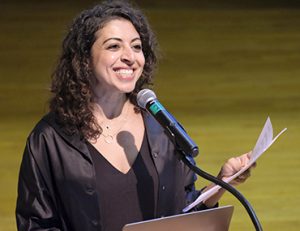On Tuesday, September 2, Bank Street Graduate School of Education welcomed a new group of graduate students with its annual Barbara Biber Convocation. The event, which is a centerpiece of orientation for incoming students, celebrates the start of the school year and provides an opportunity for the College community to engage with seminal thinkers on leading issues in education.
This year’s event began with opening remarks from the Graduate School’s new dean, Suzanne S. McCotter, who warmly welcomed students, alumni, faculty, staff, and friends and introduced herself to the community.
McCotter said, “Convocation is our chance to gather as a full community, recommit to our shared values, and begin the year with energy and purpose.” Reflecting on her personal connection to Bank Street, she said, “When I was young, my father taught in the School for Children, and so I grew up in and around this community. In many ways, coming here has felt like coming home. In a world of constant change, it’s grounding to be a part of a place where values consistently align with action.”
 The convocation featured a keynote presentation from Nawal Qarooni entitled “Building Nourishing Collaborations: Exalting Our Children and Their Caregivers.” Soyoung Park, Director, Online Programs in Early Childhood and Childhood Special Education, introduced Qarooni, highlighting her impact as an educator, writer, literacy coach, and founder of NQC Literacy. Quoting from Qarooni’s recent book, Nourishing Caregiver Collaborations, Park reflected on the power of literacy as “the teaching of what it means to be human,” and shared her excitement for the community to learn from Qarooni’s insights.
The convocation featured a keynote presentation from Nawal Qarooni entitled “Building Nourishing Collaborations: Exalting Our Children and Their Caregivers.” Soyoung Park, Director, Online Programs in Early Childhood and Childhood Special Education, introduced Qarooni, highlighting her impact as an educator, writer, literacy coach, and founder of NQC Literacy. Quoting from Qarooni’s recent book, Nourishing Caregiver Collaborations, Park reflected on the power of literacy as “the teaching of what it means to be human,” and shared her excitement for the community to learn from Qarooni’s insights.
In Qarooni’s keynote, she described the framework she has developed for “nourishing caregiver collaborations” and urged educators to move beyond one-off family events toward deeper partnerships that elevate families’ existing strengths.
Qarooni spoke about her own upbringing as the daughter of Iranian immigrants, sharing childhood stories of simultaneously feeling pride in her family’s culture and also feeling burdened by shame in school settings that didn’t reflect her family’s ways of being.
“I had internalized the way that I thought families should look and act,” Qarooni said. “What I understand now is that the difference was not a deficit. But at the time, it shaped how I showed up in school spaces.”
She also connected her research to the lived experiences of her own children, reflecting on her daughter’s journey through multiple schools before finding belonging in a community that prioritized emotional safety.
Qarooni said, “She has never been happier—not because of resources or prestige, but because her teacher made her feel safe, seen, and loved. We cannot separate knowing the children we teach from knowing their families.”
Qarooni stressed that literacy extends far beyond books and classrooms and can be seen in everyday acts of communication, from storytelling and text messaging to cooking together and passing down family traditions. True to Bank Street’s emphasis on participatory learning, she invited the audience to join in reflective turn-and-talk moments, asking them to pause and share with neighbors their own memories of belonging in school, the different ways they understood family and literacy, and how these personal experiences shape their work as educators.
Underscoring her point that literacy and family engagement are living practices shaped by dialogue and connection, Qarooni reminded educators to see their students and their families in their full humanity and emphasized that the larger goal is rooted in care, inclusion, and love.
“Families know—they have always known,” Qarooni said. “They are already doing literacy every day. We just need to listen. If I may ask you to make one shift in your work, it is to constantly underscore getting to know students and families in your daily practice. That is actually our responsibility. The teaching of literacy is actually the teaching of what it means to be human.”
The convocation concluded with refreshments and a book signing with Qarooni. For new students, the evening continued with program orientations that marked the formal beginning of their Bank Street journey.
The Barbara Biber Convocation recognizes the contributions of Barbara Biber to Bank Street and the wider educational community. Dr. Biber was a central figure shaping the institution that evolved from the Bureau of Educational Experiments to become Bank Street College. A keen observer of children and classroom practice, her writings achieved a rare depth of insight and conceptual elegance. As a researcher and scholar, she continuously reexamined and refined her thinking. This lecture memorializes her progressive legacy.